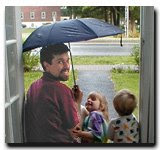It’s time for Mainers to start panicking about heat this winter.
As you may have noticed, heating oil is ridiculously expensive and seasoned wood is nearly impossible to find. You may be tempted to buy a new high efficiency oil boiler, put in a wood pellet stove, drill a geothermal well or switch to propane, kerosene or natural gas. My advice: don’t.
The billowing cloud of high fuel costs has a silver lining. Conservation makes more sense than ever. Before you splurge for a new heating system, consider better investments.
- Insulate, weatherize and landscape. You probably know how many miles per gallon your car gets, but how many degree days per gallon does your home get? (The average house in Maine gets about seven.) The higher your fuel costs, the more dividends you earn when you invest in your ceilings, walls, windows, floors and doors. Think money doesn’t grow on trees? It does when you plant a wind break north of your house.
- Upgrade your thermostat. Do you heat your whole house all the time? Your single most cost-effective investment might be a programmable thermostat. It saves you money by always turning off the heat when you don’t need it.
- Let in the sun. Every year, a sunny 0.25-acre lot in Maine receives the energy equivalent of 40,912 gallons of #2 heating oil. Yes, you read that right: one-quarter acre of sunshine in just one year provides more energy than all the oil an average Maine home burns in 40 years. Why not use this free solar energy? Renovate your southern exposure, hang a solar space heater on a southern wall, or landscape the south side of your house for winter sun.
- Heat yourself, not your possessions. Which rooms in your house do you actually use? Add electric space heaters to keep active areas in the 60s or 70s, make sure your pipes are insulated, then lower your main thermostat to keep the rest at 50˚. Unsure which circuits can handle the extra draw? Ask an electrician to review your wiring and label your outlets. Worried about freezing pipes? Ask the company that cleans your boiler to examine your plumbing runs.
Central heating systems are unnecessary in Maine’s high performance homes. As we build more efficient homes, we’ll solve our annual heating crisis. In the meantime: don’t panic!
For additional home heating resources and links, visit www.FWHorch.com/gogreen.
Fred Horch is the founder of F.W. Horch Sustainable Goods & Supplies in Brunswick, providing practical products and trustworthy advice for sustainable living. Online at www.FWHorch.com.


1 comment:
The load at which neutral equilibrium of a column is reached is called the critical or buckling load.
Wood columns
Post a Comment